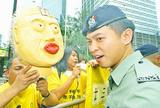Saturday, Jun 28, 2003

A police officer stands in front
of a bust of Hong Kong's Chief Executive Tung Chee-hwa carried by
pro-democracy demonstrators as they protest outside Hong Kong's legislative
council where Tung was holding a question and answer session with lawmakers,
on Thursday.
PHOTO: AP
Protesters were beginning a 100-hour hunger strike in Hong Kong yesterday ahead of a mass demonstration next week which is expected to bring 100,000 people out in the streets against a planned national security law.
The protest against the law, which will potentially give Beijing the power to outlaw organizations in Hong Kong it considers a threat to national security, is expected to be the biggest seen in the former British colony since it was returned to Chinese sovereignty in 1997.
Embarrassingly for the Hong Kong government, the main demonstration falls on July 1, the sixth anniversary of the handover when Chinese Premier Wen Jiabao will visit to oversee the official celebrations of the anniversary.
The group of around a dozen hunger strikers plans to keep up their action until Tuesday when the march takes place. July 1 is a public holiday in Hong Kong held to mark the anniversary handover.
Hong Kong's Chief Executive Tung Chee-hwa stoked the anger of the law's opponents Thursday by saying the US, which opposes the law, had been "misled" by pro-democracy campaigners who traveled to Washington.
He also suggested the march could damage Hong Kong's international reputation, telling legislators that "over-politicized marchers" might make investors wary of putting money into the territory.
Tung said the law was necessary for "social cohesion and stability" in Hong Kong.
Pro-democracy leader Martin Lee hit back at Tung's comments yesterday, dismissing suggestions that the US and other overseas opponents had been misled or failed to understand the details of the national security law.
Speaking from London, where he is lobbying British politicians against the law, Lee told government-run radio station RTHK: "They [the US government] criticize the bill because of the proscribing mechanism -- that is that if Beijing proscribes any organization on mainland China it could be followed by the proscribing of related organizations in Hong Kong."
Critics of the national security law such as Lee fear it will be used to outlaw groups such as the Falun Gong, which is banned in mainland China [...] but is free to practice in Hong Kong.
Washington earlier this month expressed concern about the planned law, which is expected to be pushed through Hong Kong's largely pro-Beijing legislature next month, and was immediately accused by government officials of failing to properly understand the issue.
http://www.taipeitimes.com/News/world/archives/2003/06/28/2003057206
Category: Falun Dafa in the Media





